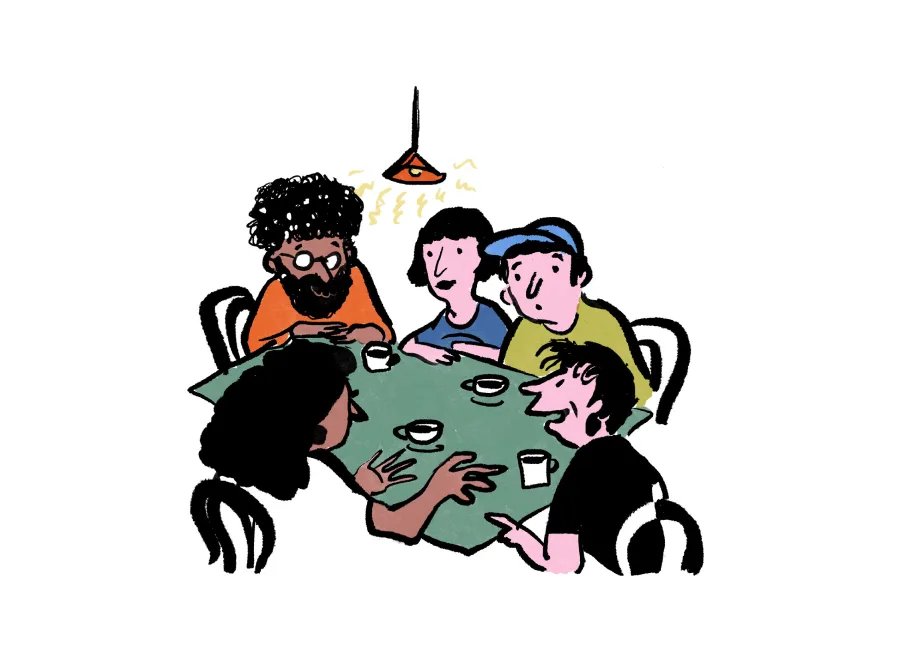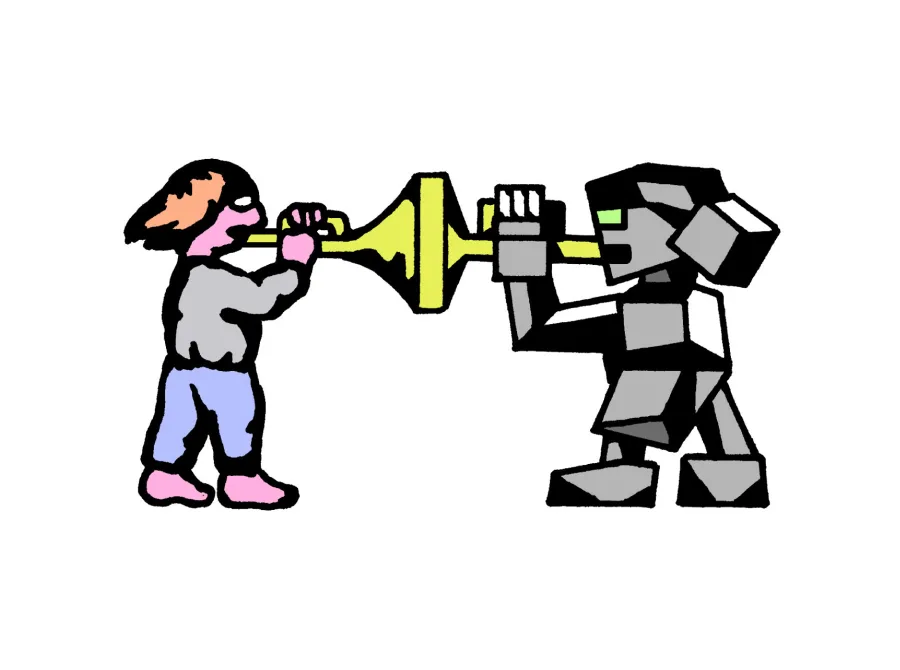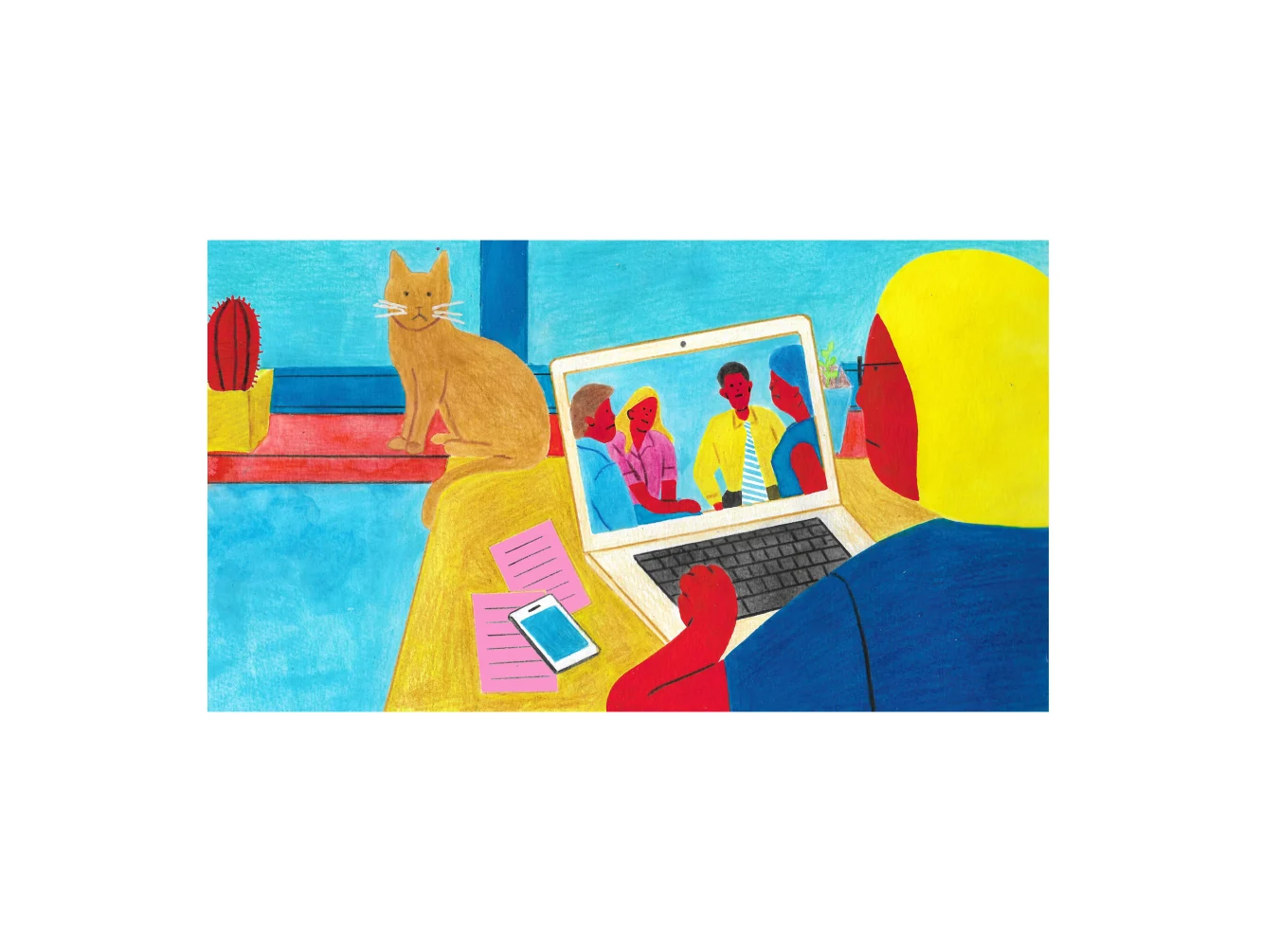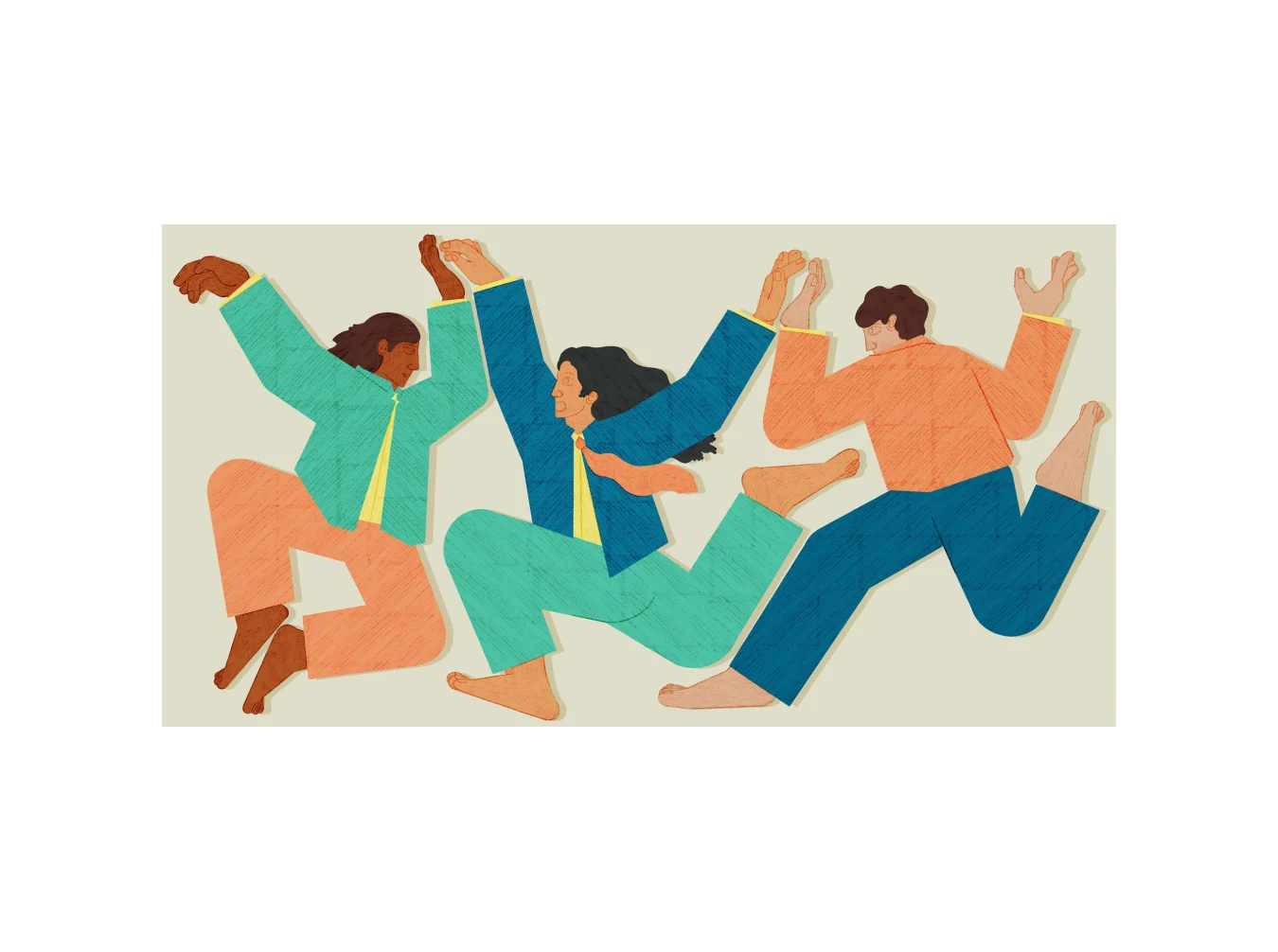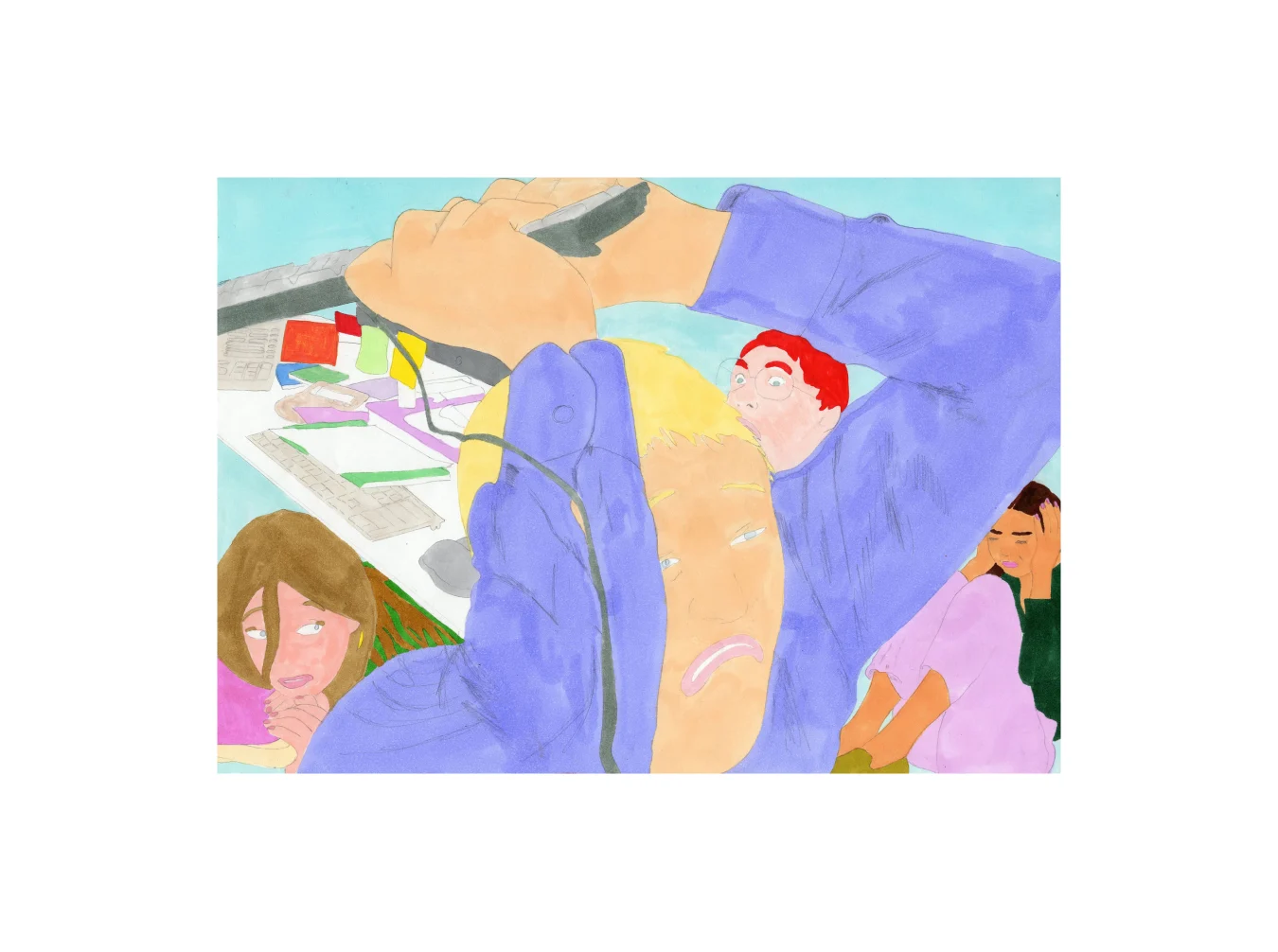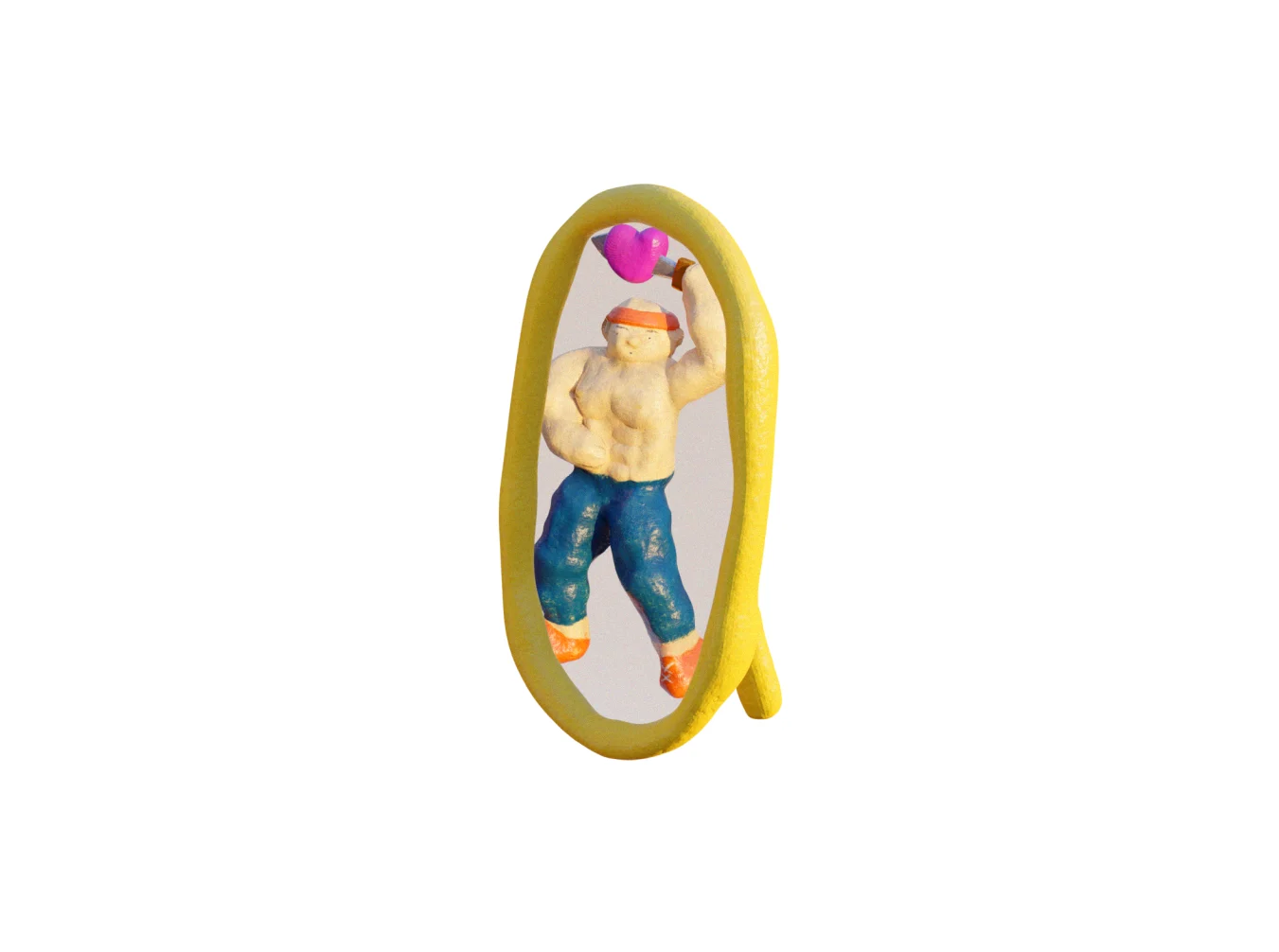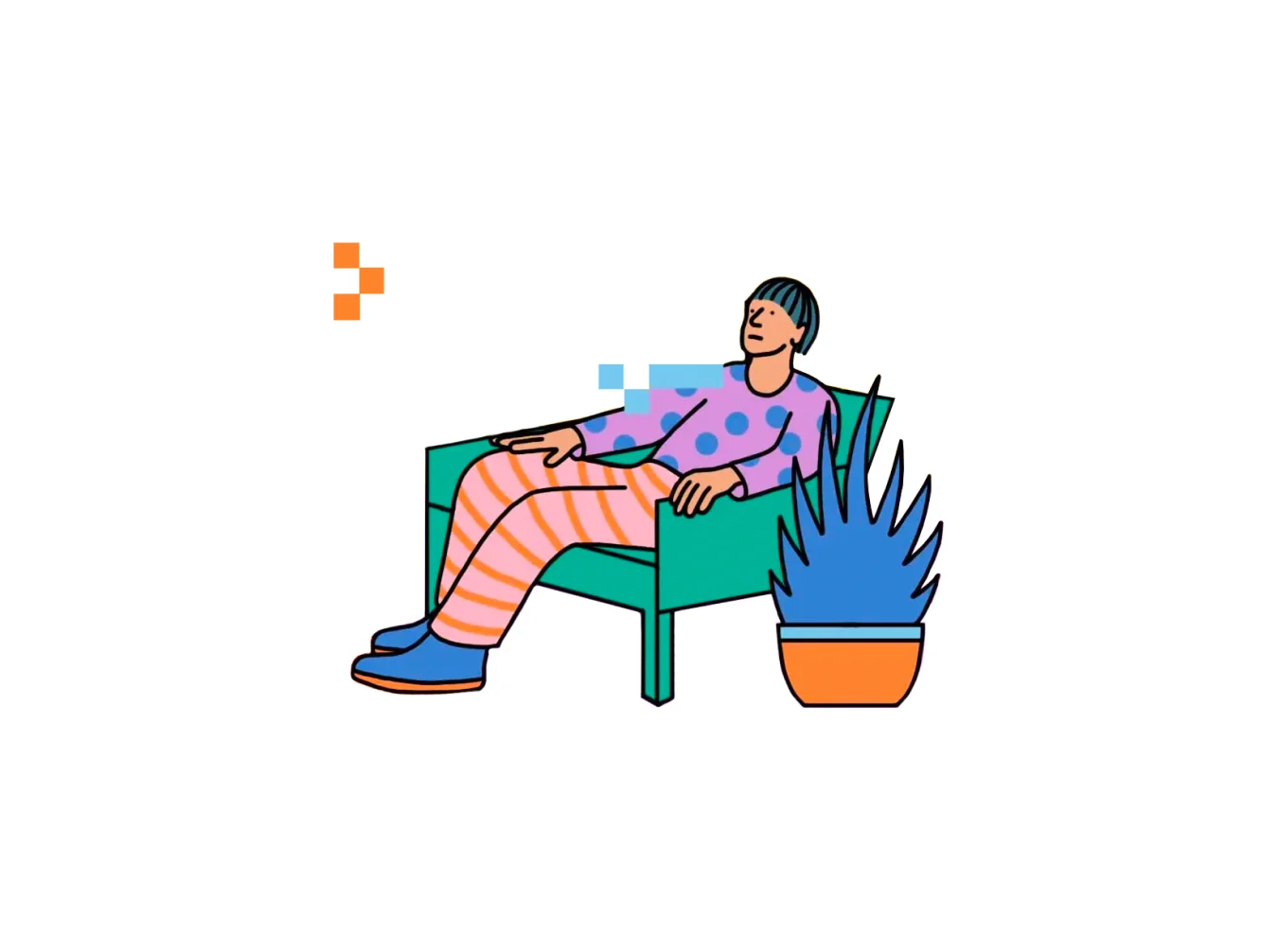
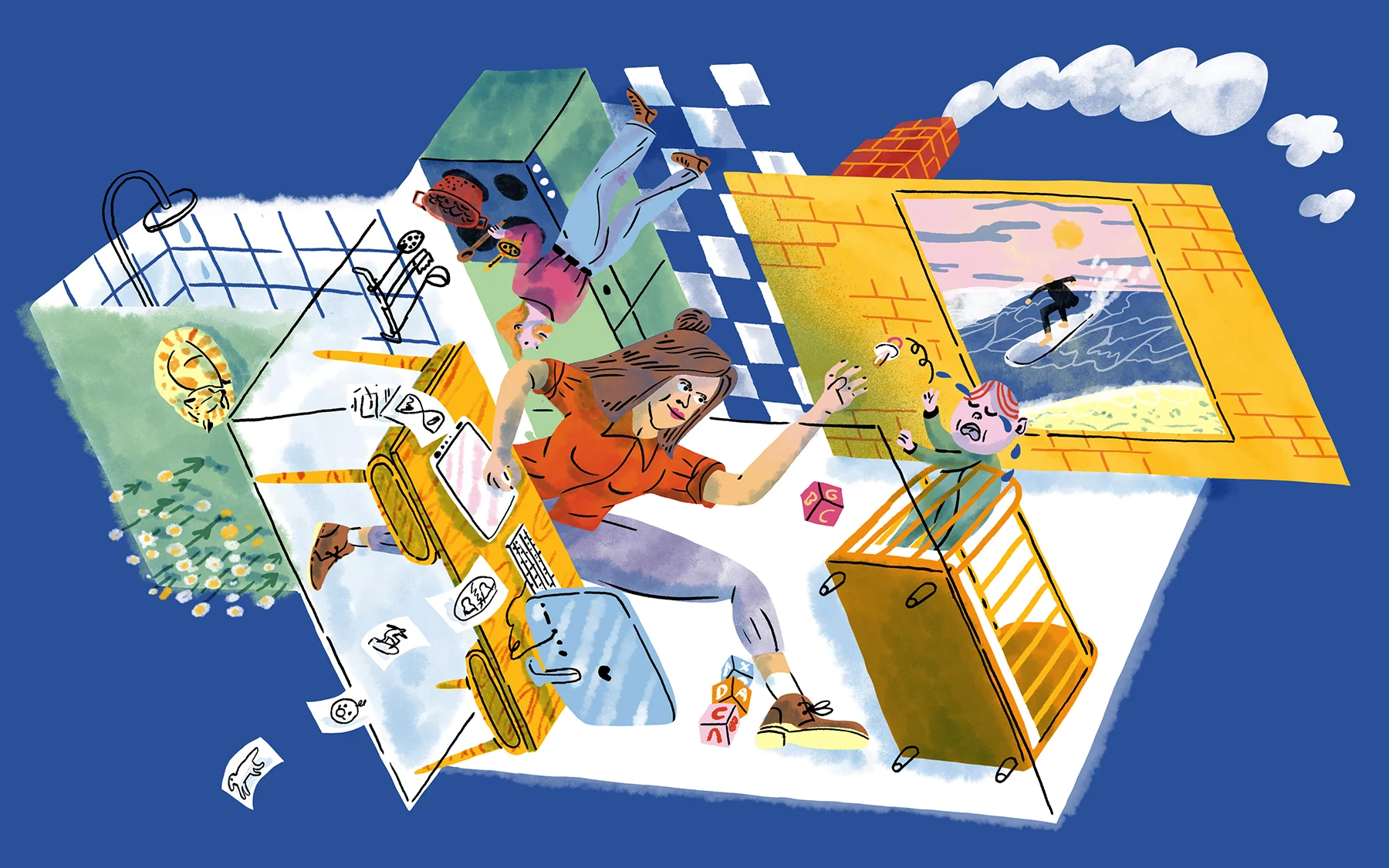
There are lots of things for creatives to think about beyond having good ideas. We’re here to help, with our advice series Stuff They Don’t Tell You. Here, James Cartwright finds out whether it’s possible to juggle working and parenting from home.
Illustrations by Aart-Jan Venema.
I’ve celebrated two major milestones in 2020. The first – filing the fifth tax return since leaving a steady job and becoming a freelancer – has made me reflect on all the lessons I’ve learned about running my own small business: managing client relationships, keeping on top of finances, navigating work/life balance from my little home office and just about managing not to screw it all up. The second – the first birthday of my son – has made me reflect on how irrelevant many of those lessons became as soon as parenthood happened.
Before he arrived, my partner and I were pretty pragmatic about how life would change with a kid in the mix – that we’d sacrifice the time we spent socialising and sleeping for wiping bums, washing nappies, preparing meals and being constantly on-hand to avert infant disasters, which come thick and fast each day. But I personally didn’t think long or hard enough about how working and raising a child in the same space might present its share of problems, contradictions and hilarious slapstick anecdotes with which I’d be able to embarrass my offspring in future.
Some of the obstacles we encounter are just part and parcel of having a child, but many are exacerbated by the fact that I can’t disappear off to an office for eight hours of total focus each day.
I was even less prepared for the sheer variety of emotions that would impact my ability to work efficiently. I’ve always been proud of the fact that, whatever the circumstances, I can get my head down and focus on work when it really counts. But it turns out that’s not the case when I’m overcome with guilt trying to make a deadline while my partner soothes our inconsolable teething baby in the next room, or when my son does something hilarious for the first time and I’d rather spend the whole day watching him than sitting in front of a laptop, or when, sleep-deprived for months, my partner and I say shitty things to each other over breakfast and I can’t write a paragraph that makes any sense while I grapple with the potent mix of shame and rage all morning. Wiping porridge from my face, shirt and trousers as I arrived late to a morning call with a client last week I was struck by how much easier it all used to be.
My approach has always been in flux. The difference now is that I have someone who is more important than anything else.
Having kids changes your whole attitude to life, not just work. It's simultaneously the most amazing and the worst thing that could possibly happen to you. It's a rocky and emotionally messy transition and you can no longer be selfish or self indulgent, especially when it comes to how you spend your time. But this isn’t some kind of pity party of an article where I bemoan the struggles of parenthood. On the contrary, we chose to have a child and it’s the best adventure I’ve ever been on. There are just a few lessons I wish I’d learned sooner. And I’m not alone.
“Lionel has put everything in perspective for me,” says freelance underwater photographer Claudia Legge, of her 15-month old son, “because when it comes down to it, he is my priority and the most important thing in the world. If I’m having a bad day, everything is made better because he’s toddling around.”
“When Kiki came, everything changed,” says Dutch illustrator Aart-Jan Venema. “Work was no longer number one, and I found it harder to display the same amount of ambition and eagerness.”
Brooklyn-based freelance artist and creative Shawna X agrees. ”I think my approach has always been in flux. The difference now is that I have someone who is more important than anything else to think about before work.”
Whatever you do for work, having a kid forces you to re-prioritize everything. But when you’re freelance and work from home, that re-prioritizing seems to happen on an almost hourly basis. Between me, Aart, Claudia and Shawna, we’ve wrangled a few tips about how to handle this constant state of flux, which are hopefully as useful to freelancing new parents as they are to the thousands of parents currently juggling work and kids while on lockdown. Good luck to all of you.
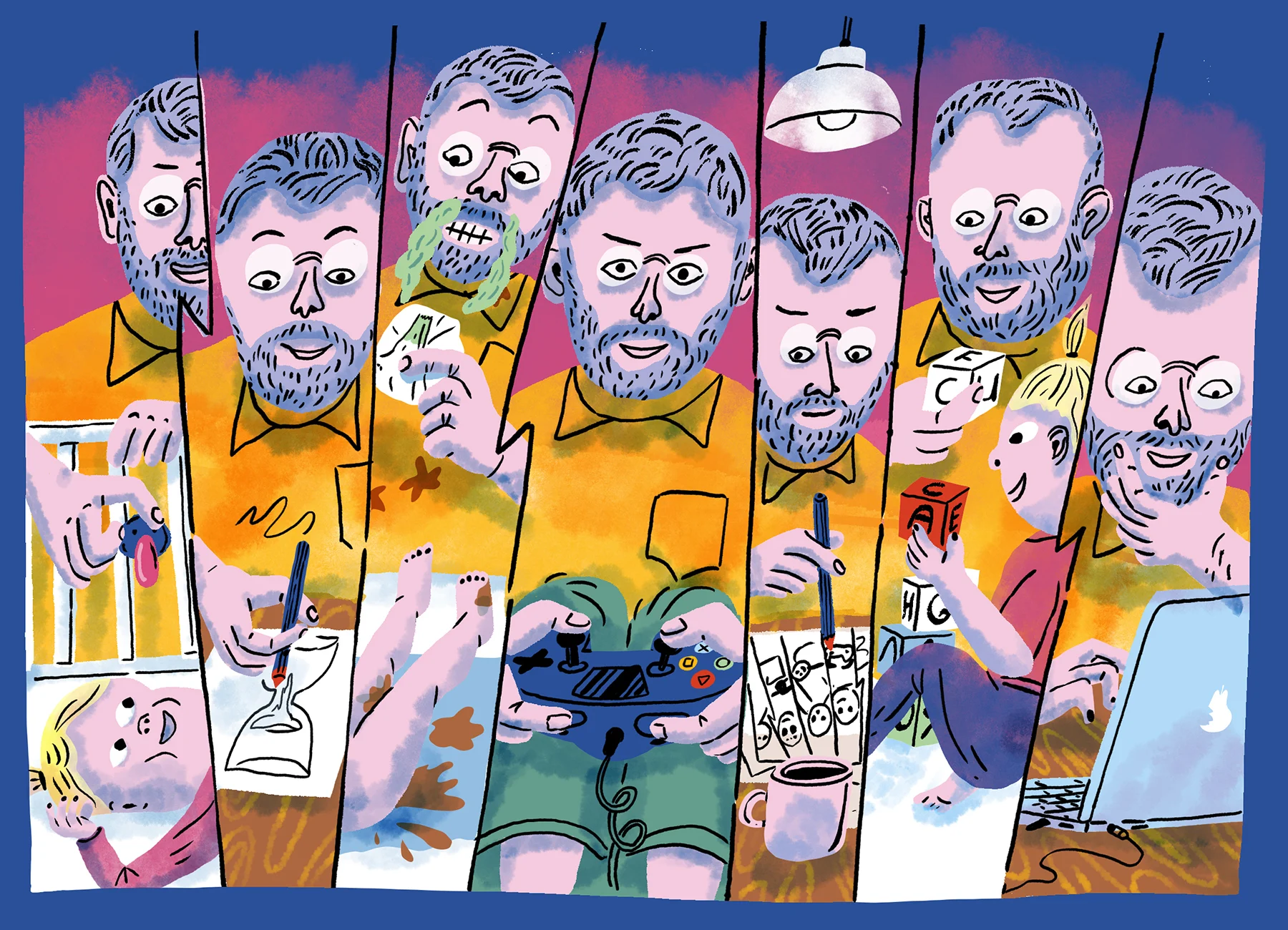
Don’t be surprised if your motivations change
I spent most of my twenties climbing a ladder of sorts and tying my sense of self-worth to how well I was doing at work. I hadn’t actually realised this was the case until it wasn’t anymore. When I became a dad, I suddenly gave a lot less of a shit about my clients and their needs (sorry WeTransfer, you guys really are great) and found it very hard to focus on writing. It took a lot of effort to find new motivations for getting up and going to work each day – money, mostly – but it also made me very protective of my time outside of work. I used to work a lot of evenings and weekends. Now I try not to.
“My time is so much more valuable now,” says Claudia. “So unless a client is going to pay me the right amount or the project is really worth doing then I’d rather spend time being with my son.”
“At this point I'm starting to let go of wanting to work as much as possible,” agrees Aart. “If I’m having a quiet week I’d rather spend time with my family where I can. If I'm actually busy, I close myself off because there really isn't another option and I need to pay bills as well.”
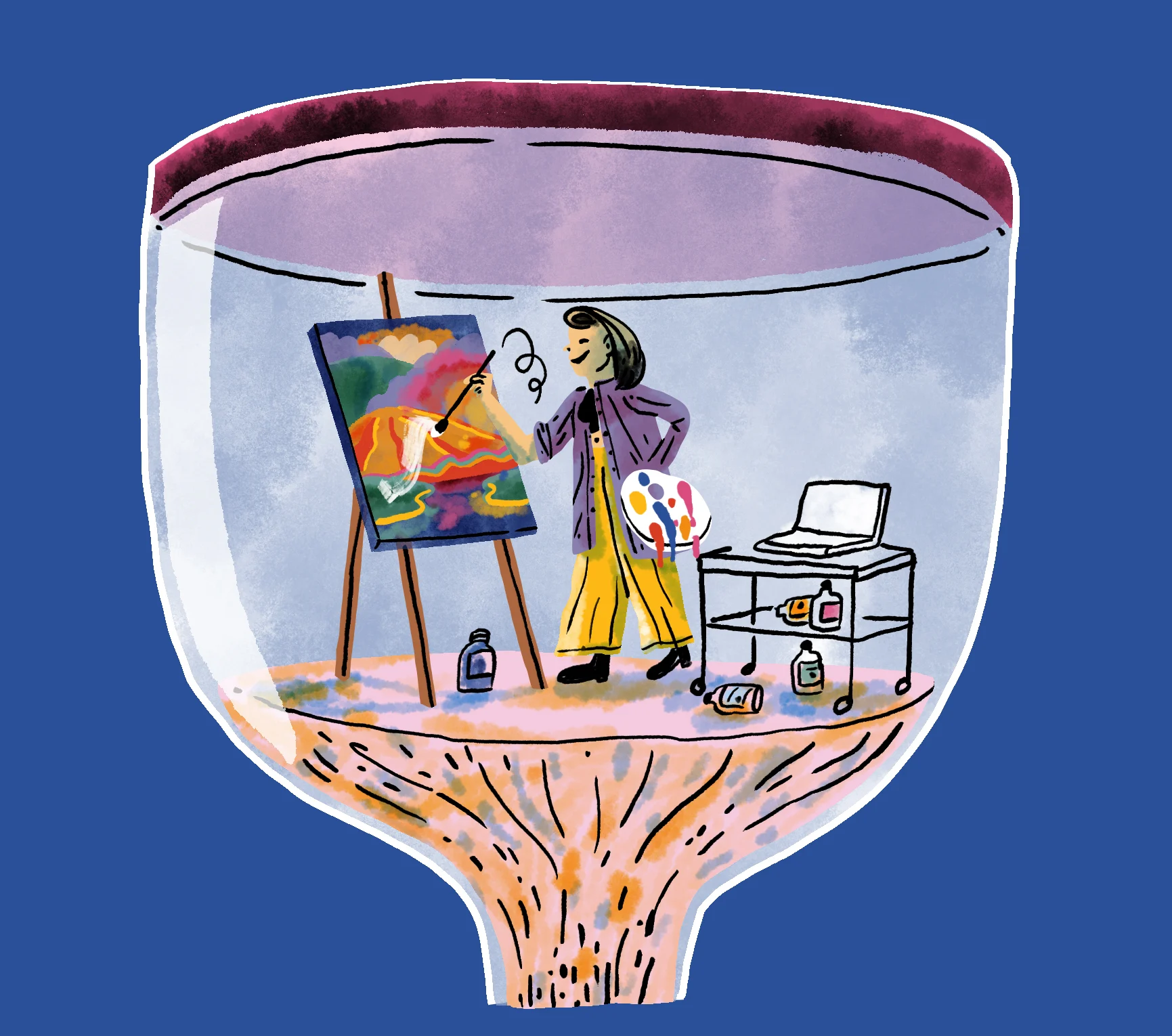
Right now I’m mostly working with leftover time, and that can make me feel a little unprofessional.

Be honest with your clients
Honesty is always a pretty good policy when it comes to client relationships. Shifting deadlines and managing expectations is already a big part of working freelance, and those deadlines and expectations need to be even more malleable when you’ve got kids. Letting your clients know the situation you’re in is really helpful. Of course you’re still a professional who delivers to deadline for your clients, but giving them some context about your situation and being clear about your limitations is vital, even if it seems like an awkward conversation to have.
“I don't really feel like bringing it up too much,” says Aart. “I don't want clients to feel hesitant to get in touch because I'm busy with the kids. On the other hand I have some longtime clients that I have personal conversations with, and a lot of art-directors are in the same boat, so it feels nice to acknowledge that situation.”
“I think it’s a mistake for someone who is going through stress outside of work to pretend it does not affect work productivity, and then inevitably project that stress into work,” says Shawna. “I notice that with people I work with, and the way they communicate is often indicative of what they're going through emotionally.”
For Claudia, being open about her new motherhood meant she could take on a dream commission when Lionel was only a few months old.
“It was six months in and I was still breastfeeding and very much in the baby bubble. Lionel was still setting all the routines. But it was an amazing experience because I had this newfound confidence in being a mother and didn’t have time to agonise over everything – which is how it normally is with a big client. I would shoot for a few hours on this big underwater campaign and then just have to unzip my wetsuit and sit with a pump on my boob while reviewing all the shots I’d taken. It was an all-female team and they made the whole experience amazing.”

Say goodbye to your laissez-faire approach to scheduling
Childcare is expensive. That’s not a complaint, just a fact. And unless you’re making money hand-over-fist, balancing work and childcare is going to be your primary goal until your progeny is of school age. Shawna and her partner now work three days a week each. “And those three days are so productive,” she says. But in order to make them productive, Shawna has embraced new levels of organisation.
“I’m now very meticulous with time management. The night before work, I set up a schedule and divide the day hourly to plan everything, from work I have to get done, to errands I have to do, to designated time to check social media. It has been vastly different than my life before, and I think for the better. Mentally preparing for a schedule and goals has made it much easier to get into the productivity zone.”
“We were never routine people,” says Claudia, “it’s not my personality type at all. But it just sort of happens when you have a baby – you just kind of slip into their routine and you have to stick to it. It’s made it much easier when it comes to organising my day.”
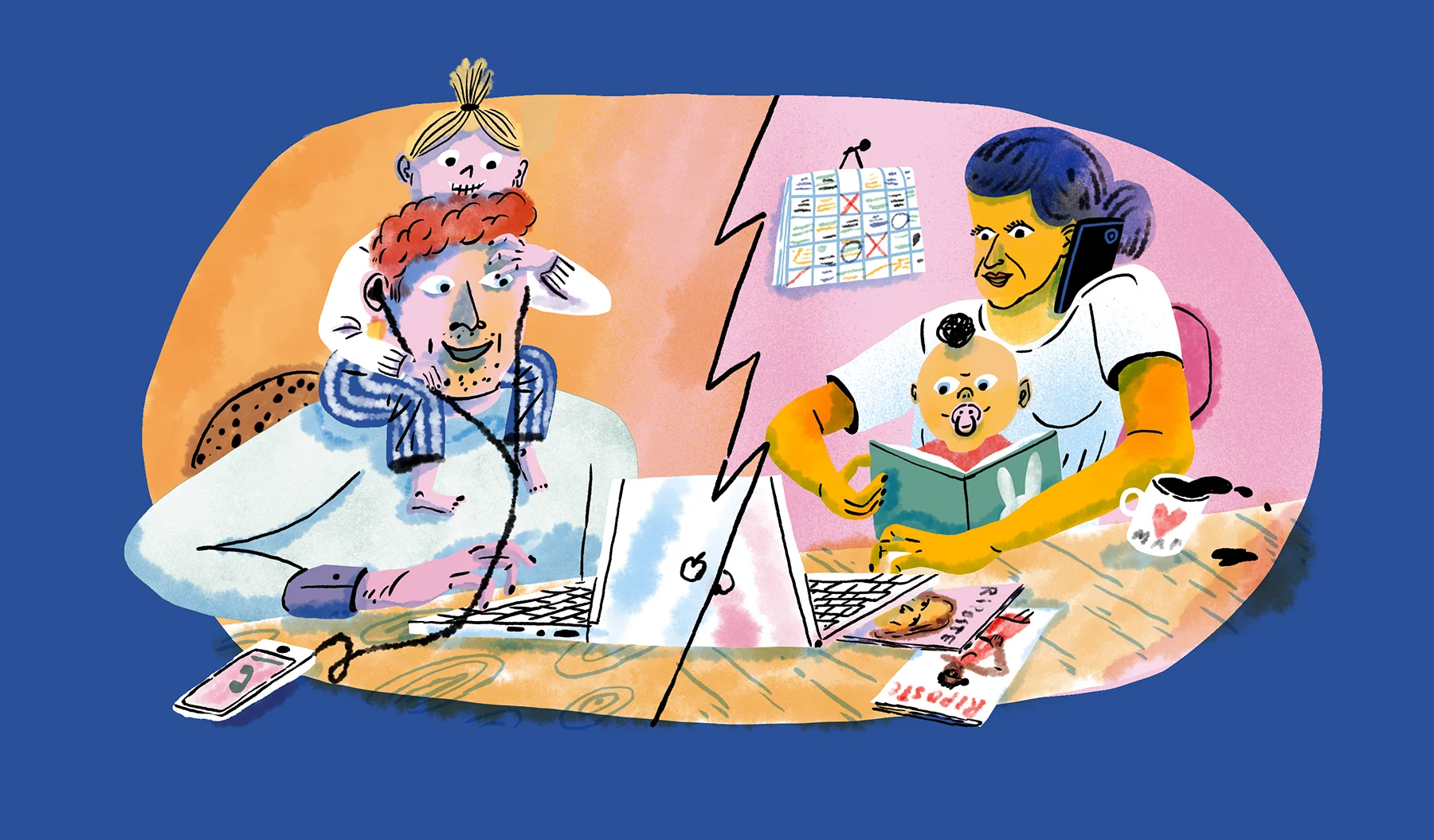
Accept that you’re less productive
Effective scheduling is a really useful tool to make your life easier, but sometimes shit (literal and metaphorical) happens when you least need or expect it. Getting used to and accepting that fact is going to be key to reducing your levels of anxiety and stress. “I’m pretty good at closing myself off when I'm not with Kiki,” says Aart, “but I have a hard time working in small chunks. It's hard not to get involved when you hear your partner having a difficult time but you're also on a tight schedule yourself. Right now I'm mostly working with leftover time, and that can make me feel a little unprofessional.”
“I just shipped a project recently, and towards the finish line, I caught myself being way too critical instead of finding a good compromise,” says Shawna. “My partner was like: ‘Shawna, it looks great. You can let this be done.’ It took some objective thinking to realise that he was right. I understand the need for quality, but sometimes you have to just let it go.”
Improve your communication
You can probably still remember a time when you only had to worry about your own timetable and what you were going to do from one day to the next. This time is now over forever. Now it’s you, your child, maybe a partner, definitely some carers, family, helpful friends, health visitors, medical professionals, clients – there’s just loads of people involved in your life now, and you have to coordinate all of them.
“Organising ourselves takes a lot of communication and a lot of compromises,” says Shawna. “Collin's work takes him away from home, so figuring out the right type of care during those times and how it affects work is just about planning ahead.”
“You just have to check in more with each other and share what you’ve learned,” says Claudia. “We’ve had to get much better at that. You also need to be clear about what time you need for yourself.”

Finding time for yourself might make you feel guilty the first time you do it, but it will also save your mental health in the long-term.
Make time for yourself
Running your work and personal life from the same space means that work often bleeds into family time and vice versa. It’s hard to set boundaries. This gets harder with a small person running round the house demanding your time, and suddenly you find yourself simply drifting from work to childcare and back again without noticing. But this will mess with your head if you let it go on for long.
When you try to squeeze that little extra bit of work time to send an email or do some research on your phone, your kid is going to notice — they may even start to freak out. It’s not a productive way to be and will only cause you frustration. It’s much better to make a clear distinction between work time and family time and learn when you need to just switch off.
Finding time for yourself might make you feel guilty the first time you do it, but it will also save your mental health in the long-term.
Aart divides his week into chunks, some of which are for work, others for childcare, and the rest for reading, gaming or surfing. “This keeps my head in a good place and stops me from wasting time by procrastinating.”
Shawna’s taken up glass blowing one evening a week. Last week I went for a two-hour bike ride and it’s made me a much better person. Everybody thinks so.
There is no more side-hustle
We’ve all been taught to accept that a side-hustle is part of the millennial freelance working model. This was always nonsense, but now even more so. You can barely find the energy to wash and dress yourself each day. Seriously, a side-hustle? Who are you kidding? Go to bed.





